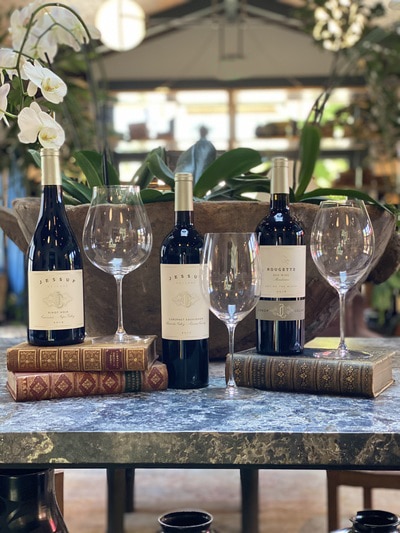The Art of Pairing Wine and Glassware
As most sophisticated wine lovers know, a vital, often overlooked component for enjoying any wine varietal involves the glassware in which it is served. While the reasons are somewhat technical and scientific, the wine industry recommends that individuals will perceive each varietal’s best features when sipping from glassware of specific shapes and styles of glassware.
As you wander the aisles of any wine or gourmet shop, you will likely see tall and short, thin or wide, large and small, and many other variations.
How do these variations affect the taste and enjoyment of the wines?
Some Basics of Glassware and Wine Pairings
Stemmed wine glasses have three parts: base, stem, and bowl. The base holds the glass upright while placed on a flat surface, while the stem is the part the wine drinker will usually grasp while holding the glass. However, note that many wine drinkers hold their glasses at the base to avoid adding a measure of heat to the rest of the vessel.
The bowl is the critical part of the wine glass. Experts recommend that drinkers fill the glass only to the widest part of the bowl to expose the wine to the maximum amount of air. Pouring to the broadest point in the glass allows the all-important aromas of the wine to collect in the upper section of the glassware.
Once poured, swirling the wine-filled glass then releases aromas that may not be apparent at first.
Here are some of the glasses typically recommended for specific varietals which can also be found at our tasting rooms in Yountville:
Red Wine Glasses
Cabernet Sauvignon, Bordeaux, or Merlot are best with oversized, wider glasses with a broad base, sturdy stem, and a large bowl that tapers inward. These tend to be oversized, offering a larger bowl to allow more oxygen exposure and release more aroma and flavor. This design lets some ethanol evaporate, causing the wine to taste smoother and bring out the fruit flavors.
Syrah, Shiraz, Sangiovese, Grenache and Malbec glasses tend to be shorter with a smaller bowl. Since these varietals are often medium to full-bodied, with some harshness and spiciness, a tapered, smaller opening gradually feeds the palette.
Burgundy and Pinot Noir glasses tend to be broader and shorter than the others. The design collects the bold aromas and directs the intense flavors to the appropriate part of the tongue. The considerable surface exposure allows for more oxygen contact.
White Wine Glasses
Sauvignon Blanc and Riesling glasses are usually longer stemmed with a narrow bowl. The glass holds less volume while minimizing the amount of oxygen exposure. The smaller bowl brings the wine closer to the nose since the aromas tend to be lighter.
Chardonnay glasses are almost the opposite of the Sauvignon Blanc and Riesling glasses. A full-bodied, oak-aged Chardonnay demands a broader bowl and frequently a shorter stem. Greater oxygen exposure allows for the presence of the wine’s more prominent aroma.
Jessup Cellars’ “Why Your Wine Glass Matters” Seminar Returns on June 5th
Jessup’s Vice President of Sales and Sommelier, A.J. Eisiminger, will lead a virtual tasting seminar and presentation with support from a leading wine glassware industry professional representing Riedel Glassware. The event will be live on June 5th from 3 PM to 6 PM Pacific Time.
The wines included for the Tasting Session to demonstrate the unique characteristics of each varietal will be Jessup Cellars:
- 2019 Pinot Noir
- 2018 “Rougette”
- 2017 Cabernet Sauvignon
The Tasting Package will include two Riedel Tasting Sets designed to demonstrate how a specific shape and size glass enhances each wine’s aroma and flavor perception. Participants will receive two Riedel Veritas Tasting Sets (6 glasses) with three distinct configurations:
- The New World Pinot Noir glass allows the bouquet of Jessup Cellar’s 2017 Pinot Noir to develop to its fullest, while the slightly flared top lip maximizes the fruit flavors by directing a precise flow onto the front palate.
- The Old World Syrah glass is designed to deliver the classic aromas of toast and black olives, which are typical for wines made of Syrah grapes and Jessup Cellar’s Granache-based 2018 “Rougette” Blend.
- The Merlot/Cabernet glass will showcase the majestically structured complexity and finesse of the Jessup Cellar 2017 Cabernet Sauvignon.
Grow your knowledge and appreciation of top-quality wines by participating in this educational and enjoyable virtual wine tasting seminar presented by Jessup Cellars, a leading Yountville winery.
The Member’s Price for the presentation, the three wines, and 2 Riedel Tasting Sets will be $276.25. For non-Members, the Program cost will be $325. (Note that the retail price for the wines and Tasting Kits alone is $507.00)
For more information and to reserve your spot for this virtual seminar, contact Jessup Cellars, a top Yountville winery, at (707)-944-5620.
Jessup Cellars also has one of the most popular Tasting Rooms in Yountville, complete with a professionally curated art gallery. Visit the Jessup Cellars website to reserve your spot for a delightful private or group wine tasting.
